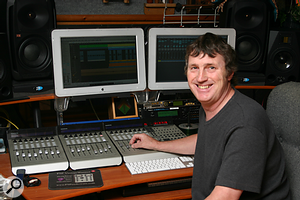 Having taken a post-Christmas look on our web site at the SOS Forum, I've been rather surprised by how emotional some people can get over software. To me this seems quite perverse, because it's hard to think of anything as inherently logical and unemotional as software — any piece of software is really just a virtual machine that always does exactly the same jobs in exactly the same ways. Nevertheless, the arguments rage between proponents of the various leading sequencers, as they do between supporters of the two main computing platforms. Most regular readers know that the Macintosh is my computer of choice, because I find it suits my 'anything for an easy life' approach to technology, but while I choose not to use a PC, I would defend to the death (well, maybe not the death — perhaps a bit of a cold or a brief headache!) the right of anyone to use a PC if it does the job for them.
Having taken a post-Christmas look on our web site at the SOS Forum, I've been rather surprised by how emotional some people can get over software. To me this seems quite perverse, because it's hard to think of anything as inherently logical and unemotional as software — any piece of software is really just a virtual machine that always does exactly the same jobs in exactly the same ways. Nevertheless, the arguments rage between proponents of the various leading sequencers, as they do between supporters of the two main computing platforms. Most regular readers know that the Macintosh is my computer of choice, because I find it suits my 'anything for an easy life' approach to technology, but while I choose not to use a PC, I would defend to the death (well, maybe not the death — perhaps a bit of a cold or a brief headache!) the right of anyone to use a PC if it does the job for them.
And it's the same with sequencers. Let's face it, modern sequencing software is absolutely amazing, whether it comes from MOTU, Steinberg, Emagic, Cakewalk, or wherever. Not only do the modern programs sequence MIDI and record multitrack audio, but they also offer virtual equivalents to just about everything in the studio, apart from the microphone and loudspeakers. Then people complain that sequencers are complicated. Of course they're complicated! They replace a whole room full of traditional studio equipment, and on top of that they give you features that no hardware studio can offer. I'm the first to complain about unnecessary complexity, and I quite agree that when an effects unit comes with a 300-page manual, the designers are probably working on the mistaken premise that you have nothing better to do than concentrate all your mental resources on that one product for the next year or two. But if you're a computer-based musician, the sequencer is probably the heart of your studio. You use it all the time, so the mental investment is worth it.
If a sequencer's workings were visible as physical moving parts, it would appear as the most complex and beautiful of machines, but because we only ever see the user interface, it's easy to criticise anything that doesn't work the way we think it should. In reality, the more people I speak to, the more different ways of working I discover, so I doubt if there will ever be a user interface that everyone agrees is exactly right, but at least the nature of software allows it to evolve via a series of upgrades. So if you have any concerns, by all means air them in the forum, but make sure you contact the software designers too, because they're the only ones in a position to do anything about it. Most software houses run a 'wish list' generated by users, and if enough people ask for the same thing there's a good chance they'll get to it eventually.
Instead of indulging in the 'my sequencer is bigger than your sequencer' type of dialogue that inspired this column, perhaps it's best just to accept that different users have a different idea of what works best, and that ultimately it doesn't matter what tools you use, as long as you make good music.
Paul White Editor
